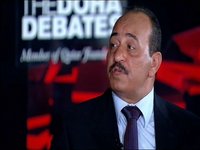This House believes the Egyptian military is not interested in genuine reform
Wednesday October 26 2011
Cairo, Egypt
MOTION PASSED
by 85% to 15%
Transcript
Order of speeches

- Introduction
- Mohamed Fahmy Menza
- Sameh Seif- Elyazal
- Heba Morayef
- Gamal Abdel Gawad Soltan
- Audience questions
- Vote result
Introduction
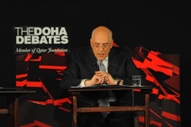 TIM SEBASTIAN
TIM SEBASTIAN
Ladies and gentlemen, a very good evening to you, and welcome to the latest in our series of Doha Debates, sponsored by the Qatar Foundation. It may not look much like it, but tonight we're in the Egyptian capital, Cairo - not the location where we had hoped to film, but in a private TV studio. The fact is that the Egyptian government summarily withdrew our permission to film in the old city two nights before the debate, and then apparently discouraged an alternative location from hosting us. Someone, it seems, did not wish this debate to take place. We're here, though, and we're in good heart tonight, and our topic is highly sensitive: the role of the military in post-revolution Egypt. Last month it widened and extended emergency powers amid allegations of continuing torture in military prisons and complaints that military trials of civilians have been unfair. But the Generals' rule is, by all accounts, extremely popular in the country. A recent poll gave them an approval rating of more than 90 percent. Many credit them with holding the country together at a time of extreme danger, and claim that for now no one else is capable of running this huge and complex country. What do you think? Well, our motion tonight is controversial but, as always, it's designed to ensure a fair debate: "This House believes that the Egyptian military is not interested in genuine reform." And our panellists, as you might expect, disagree fundamentally on the issue. Speaking for the motion: 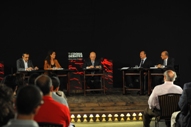 Mohamed Menza, founding member of the recently formed Misr Al Horreya, Egypt Freedom Party; and with him, Heba Morayef, Researcher in the Middle East and Africa Division of Human Rights Watch. Speaking against the motion: General Sameh Seif-Elyazal, Chairman of the Al Gomhouria Center for Political and Security Studies; and with him, Gamal Abdel Gawad Soltan, Professor of Political Science at the American University of Cairo and former Director of the Al-Ahram Center for Political and Strategic Studies. Ladies and gentlemen, that's our panel. So now let me please ask Mohamed Menza to speak for the motion.
Mohamed Menza, founding member of the recently formed Misr Al Horreya, Egypt Freedom Party; and with him, Heba Morayef, Researcher in the Middle East and Africa Division of Human Rights Watch. Speaking against the motion: General Sameh Seif-Elyazal, Chairman of the Al Gomhouria Center for Political and Security Studies; and with him, Gamal Abdel Gawad Soltan, Professor of Political Science at the American University of Cairo and former Director of the Al-Ahram Center for Political and Strategic Studies. Ladies and gentlemen, that's our panel. So now let me please ask Mohamed Menza to speak for the motion.
Mohamed Fahmy Menza
Speaking for the motion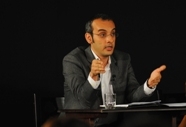
MOHAMED FAHMY MENZA
Thanks, Tim. Ladies and gentlemen, good evening. As we start our debate we should ask ourselves what do we mean by "real and genuine reform": isn't it a process that leads to a radical and positive change in the state and the society in order to improve the poor social, economic and political conditions under which Egyptians lived for decades; a clear-cut divide with the forces, tactics and strategies of the ancient regime which have led to the Egypt that we knew on the eve of January 24th? If so, what has the SCAF done on the path of attaining such change? Not much, I'm afraid. If we look at the economic sphere, we'll find that the continuing fragile status of the security meant that the investment and tourism sectors, which are both vital for the Egyptian economy, are still badly hurt with no signs of improvement. In the social sphere, freedoms of speech are interrupted, censorship is encroaching on the various forms of expression, and the rights of the Copts, among other minorities and groups in society, continue to be neglected. Politically speaking, apart from the proclaimed commitment to uphold the elections free and fair - which is questionable, of course, if we take into account the context under which such elections will be held - the SCAF has barely allowed for any active political participation in decision-making processes from various political and social forces, let alone set a clear timeline for a transitional phase, which is now expected to last for more than two years. This all goes to show that the military is not really interested in giving up much power to the people, or any power actually to the people. At the moment they have legislative and to a good extent also executive powers, with a considerably weak government currently in place, and a fragmented parliament that is expected to be formed. As the monopolisers of the only institutional entity that's capable of exercising use of force, and which has been given a good deal of legitimacy from the people after January 25th, the military has been delegated with the responsibility of attaining the objectives of the revolution: freedom, social justice and human dignity. And now, after more than eight months from the fall of the previous regime, one can safely say that they haven't put the country on the path of attaining these objectives. Ladies and gentlemen, it is for these reasons that we call on you today to vote for this motion: that the House believes that the military is not really interested in pivoting for real or genuine change in Egypt. Thank you.
TIM SEBASTIAN
Mohamed Menza, thank you very much indeed. You were calling for radical and positive change. You don't notice any change - the proliferation of political parties in this country now, the free vote that's taking place, the former dictator and his family put on trial, people tried with corruption? All this, all these necessary steps towards democracy, all this has been guided by the military rulers and has happened on their watch with their agreement and their active participation. How can you say 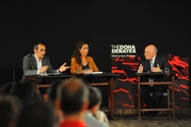 nothing has changed?
nothing has changed?
MOHAMED FAHMY MENZA
I don't think that we're debating for the fact that positive change has taken place after the ousting of President Mubarak.
TIM SEBASTIAN
But they've spearheaded it, haven't they - the military has spearheaded this change?
MOHAMED FAHMY MENZA
I think every single bit of positive change that happened in this country was earned by the people of this country, and it was not given by the military.
TIM SEBASTIAN
But if it wasn't given by the military, they're certainly not standing against it, so they show no signs of wanting to interrupt the process towards democracy, are they...
MOHAMED FAHMY MENZA
I think there are a..
TIM SEBASTIAN
... if they're allowing all these political parties to function, free votes to take place? You're going to have elections...
MOHAMED FAHMY MENZA
There are a lot of signs, on the other hand, that show that the military, as we just said and as we will say throughout this episode, are not really interested in pivoting for other, positive change.
TIM SEBASTIAN
But how much do you expect in nine months? How much do you expect? Look at the political dialogue and the space for political dialogue in this country compared to what it was.
MOHAMED FAHMY MENZ
I expect a lot more. What we're debating here today, Tim, is...
TIM SEBASTIAN
..is reform. We're debating genuine reform: is the military interested in it? It's taking place with their full agreement and backing.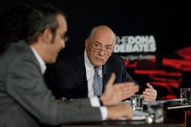 MOHAMED FAHMY MENZA
MOHAMED FAHMY MENZA
I'm not sure that this is with their full agreement. I still stand that...
TIM SEBASTIAN
But they could stop it if they didn't want it, couldn't they?
MOHAMED FAHMY MENZA
I don't think they could because, again, it's the people that battle for change. It's the people that work on getting these changes. Every single bit of positive change that happened in this country, ever since the revolution, was the outcome of an ongoing struggle with the authority and with the military in the core of this...
TIM SEBASTIAN
And now the authority, which is the military government in this country, the military authorities, are standing back and saying, "Go ahead. Go ahead. Have your political parties. Have your elections."
MOHAMED FAHMY MENZA
Well, "Have elections" ...
TIM SEBASTIAN
"Put the old leaders on trial." I don't see what your complaint is, that in nine months I would have thought that was a lot of positive, reformist change.
MOHAMED FAHMY MENZA
I don't think so, because at the same time in which we're witnessing political opening, we're also witnessing other forms of restrictions on freedom of expression, restriction on political action. And it's not just enough to have a cosmetic process of having some so-called "political entities" that have not been given the time and have also been exposed to a lot of pressure from the military and from the authorities on their actions and activity throughout the country.
TIM SEBASTIAN
All right. Mohamed Menza, thank you very much indeed.
MOHAMED FAHMY MENZA
Thank you.
TIM SEBASTIAN
Now let me call on General Seif-Elyazal to speak against the motion, please.
Sameh Seif- Elyazal
Speaking against the motion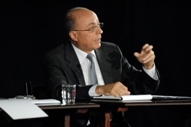
SAMEH SEIF-ELYAZAL
Thank you very much. Good evening, ladies and gentlemen. Thank you very much for coming. I'm very happy to be here with you tonight. First of all, I am of course an ex-military general, so you will see me maybe talking on behalf of them. I'm not talking on behalf of anybody; I am just giving you my opinion, my personal opinion. And as you know, I'm doing this every night everywhere in the media. So I'm doing the same thing tonight: which is I'm going to give you my personal opinion without any pressure from anybody. This is to start with. Number One, I just want to remind you, if we remember 1st February when the SCAF came and they announced the first message to the public of Egypt, they said: "We're going to protect the revolution. We will not fire any bullet against any Egyptian." Number Three, they want the regime to be changed. Remember the date: it's 1st February. Mubarak was there, was still there. Just imagine that if Mubarak will not leave the power on 11th February, what will happen to these guys? Execution, I am sure, with the system of Mubarak, who will execute the members of SCAF. They took the risk and they insisted that they will support the revolution whatever the result is after that. So I just want to remind you, because many people do not remember that they were with the revolution from day one, even eleven days before Mubarak leaves power. This is Number One. Number Two, what they did in the nine months. I'm going to highlight very important issues and leave the rest to maybe during the questions. I'm not writing anything, seriously, I'm not prepared for anything; I'm just talking to you frankly and just as if I'm doing it every day. If you remember, parties in Egypt. If you like to form a party in Egypt, you have to go through very difficult procedures. You have to go to a committee, which 99 percent of the time refused to form a new party. Now you don't need to go anywhere; you just send a piece of paper to announce that "I'm going to form that party." Easy and simple. 49 parties now in Egypt. There were 24; now 49 today, I think, in no time. Easy to go. Democracy. Again, as soon as they took power what did they do, first thing, they assemble the General Assembly, the parliament. Because everyone was complaining it was not a fair election. Same thing for Shura, democracy. Then no more old parliament, no more old Shura Council. Constitution: everybody was complaining about the constitution, because Mubarak actually tailored that constitution for his needs. No limits for presidency - forever, lifetime. What they did, SCAF changed the constitution. A referendum took place to take the opinion of the people: "Do you agree or not?" And the first item, they deleted that particular one. Everybody was complaining about it. Everybody in Egypt.
TIM SEBASTIAN
Could I ask you to come to a close quickly?
SAMEH SEIF-ELYAZAL
Oh, sorry, okay. I have many other issues. I'm sure we'll answer that during the questions. Thank you for the time. Tim.
TIM SEBASTIAN
General Seif-Elyazal, thank you very much indeed. If the military is so keen on democracy and you've talked about the political parties, why the need to torture people in military prisons, to have forced virginity tests on women who were taken into military captivity?
SAMEH SEIF-ELYAZAL
That was not really true, let me tell you. Yes, many people are talking about that. Not a single case went to a hospital, and they came with a medical certificate saying...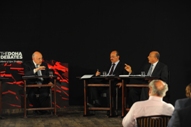 TIM SEBASTIAN
TIM SEBASTIAN
But we saw the pictures, the video posted online September 28th showing members of the army and security forces beating and electrocuting detainees. Why is that necessary if the military is as popular as it seems to be in this country?
SAMEH SEIF-ELYAZAL
All right, first of all, I don't trust any videotape, because you can put things and you can delete things and you can - you know, the software now, you can do anything.
TIM SEBASTIAN
But would you trust Major General Abdel Fattah al-Sisi of the Supreme Council, who said in answer to questions which were put to him by Amnesty International that the culture of the army needed changing and orders had been given now not to abuse detainees. That suggests that something seriously wrong was happening.
SAMEH SEIF-ELYAZAL
I'm not denying that nothing happened, but first of all they actually agreed that .. another video came and the SCAF mentioned that they are questioning officers participating in that particular issue. But...
TIM SEBASTIAN
But such behaviour really undermines...
SAMEH SEIF-ELYAZAL
Yeah, but virginity (tests) is something else. I'm still very hesitant to believe it, believe me. And I don't have any evidence in front of me immediately.
TIM SEBASTIAN
Well, what about the military admission that they're not going to do it anymore?
SAMEH SEIF-ELYAZAL
No, no, they didn't say that it happened. But they said was they will not do it, period. But believe me, there's not a single case..
TIM SEBASTIAN
No, they said they wouldn't be doing it any more. That was the key point. There were a number of women who all said that they were subjected to these forced virginity tests.
SAMEH SEIF-ELYAZAL
I want to see one of them going to hospital and they come with a piece of paper saying that, "Yes, we check her and that happened." None of them. I don't know why. First thing you'd do when things happen to you like that, you go to the hospital and they give a certificate saying that, yes, they..
TIM SEBASTIAN
The military explanation for doing it was that they didn't want to be accused of rape while the women were in captivity.
SAMEH SEIF-ELYAZAL
Forget about military. I want to know why those ladies didn't get certificates from the hospital saying that they did that to them. I want evidence. I want written evidence.
TIM SEBASTIAN
And the military trials of civilians: 11,000 trials of civilians, was that really necessary if the military is committed to democracy and reform?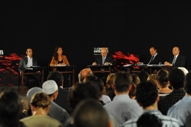 SAMEH SEIF-ELYAZAL
SAMEH SEIF-ELYAZAL
There were more than eleven - to be frank with you.
TIM SEBASTIAN
More than 11,000? So for example, four times under the Mubarak era. Sign of democracy?
SAMEH SEIF-ELYAZAL
I'll tell you why. There's a reason for that. Yes, definite, yes. I'll tell you why.
TIM SEBASTIAN
Three minutes each in court - fair trial?
SAMEH SEIF-ELYAZAL
No, no. Half a minute, I will give you the answer. Very simple. We have a court of law here in Egypt. The justice in Egypt is very slow. So normal court issues and normal court procedures taking too much time.
TIM SEBASTIAN
So they thought they'd speed it up with some swift justice?
SAMEH SEIF-ELYAZAL
No, no! No, no! [laughs] Anyway, back to the point. Normal procedures take a long time, and we know that Egyptian justice is very slow. And I mean, everybody knows that. You have thugs - you have arms in illegal hands, you have instability, security is not in a good place. So what you usually do if you arrest one of these guys and send them to court, you have to wait two years.
TIM SEBASTIAN
Okay, yes. I need to stop you. I'm sure...
SAMEH SEIF-ELYAZAL
I am against civilian trials in military court. There's no question about that.
TIM SEBASTIAN
Okay. Well, I'm sure we're going to have a lot of discussion on this subject. All right, thank you very much indeed.
SAMEH SEIF-ELYAZAL
All right, thank you.
TIM SEBASTIAN
Now let me please ask Heba Morayef to speak for the motion.
Heba Morayef
Speaking for the motion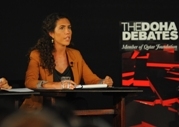
HEBA MORAYEF
This military isn't interested in real reform because this military doesn't understand what reform means. On March 9th 190 peaceful protesters were arrested, were taken to the grounds of the Egyptian Museum. They were beaten, they were whipped, they were given electric shocks, the 17 women included. The next day, on March 10th at the military prison seven of those women were subjected to forced virginity tests. In this context that amounts to sexual assault. The military subsequently formally deny this, but we have off-the-record admissions, we have admissions from reliable sources within the military that this occurred, and we have an implicit recognition to us in a meeting with the Supreme Council of the Armed Forces that this was something that they were investigating. One of those women has filed a complaint before the Military Prosecutor and another complaint before the Council of State. And until this day that complaint hasn't gone anywhere because the Military Prosecutor is saying he's still waiting for the results of the investigation from the military prison to arrive. What we have here is a situation where the military has not only conducted exactly the same abusive practices of the Mubarak regime which led to the January 25th uprising in the first place, but we also have the second element which caused that anger on January 25th, which is impunity. Until this moment not a single military officer has been investigated or prosecuted for the acts of torture which took place, not only on March 9th but on subsequent cases, for the excessive use of force which occurred on a number of different occasions and protests leading up to the latest and very tragic incident at Maspero, where army vehicles ran over 21 individuals. Not talking about how that started - that in and of itself is evidence. I think beyond this what this shows, what this impunity shows is that the army doesn't realise that a break with the past means that people were longing for the promotion of respect for the rule of law. What they wanted was to end the position of the police above the law, the feeling that police officers could get away with it. And yet instead what we have right now is military officers who are in that same position. We have a military that doesn't understand what rule of law means, what reforming this country means. Instead they not only reactivated the emergency law, they expanded it to beyond what we had under Mubarak. 12,000 military trials of civilians, a position that every human rights organisation is completely against because no civilian should be tried before a judge who responds to his military superior. And we have masses of examples of individuals given very short trial.
TIM SEBASTIAN
Could I ask you to close?
HEBA MORAYEF
The failure to prioritise the rule of law, the failure to actually reform the police to address police abuse, to investigate any police officers for torture, all of this shows a desire to protect the status quo and not to really reform the system.
TIM SEBASTIAN
Heba Morayef, thank you very much indeed. You say the army wants to protect the status quo. Who was it that pushed out Mubarak, if it wasn't the army?
HEBA MORAYEF
The army, I believe, made a conscious decision which was clearly something that they'd been thinking about for a while - they've said this in subsequent statements - that they didn't like Mubarak's plans for a handover.
TIM SEBASTIAN
But they were the ones who did it. They were the ones who did it.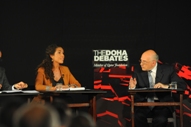 HEBA MORAYEF
HEBA MORAYEF
Of course. Of course.
TIM SEBASTIAN
It wasn't the people in the streets. It was the military pushed them out.
HEBA MORAYEF
The people in the street initiated it and this is partially a soft coup, which is the problem that we're facing today. This was in the military's interests. And since then they've portrayed themselves as protectors of the revolution while trying to give....
TIM SEBASTIAN
How much reform do you think you would be seeing in this country if the military hadn't brought it about and wasn't actively promoting it? How many political parties, how many prisoners would you still be seeing, political prisoners in jail?
HEBA MORAYEF
I'm not denying the political parties. Well, we have 12,000...
TIM SEBASTIAN
How many banned parties would there still be if the military hadn't brought about the new situation?
HEBA MORAYEF
Not questioning the party establishment. The turning point was June and July of this year. Initially the military was giving some space. And then people started criticising them, and they didn't like it. So they started arresting bloggers, they started summoning people on charges of assaulting the military, they started interfering with the media.
TIM SEBASTIAN
I think they've already admitted that they needed to change their culture.
HEBA MORAYEF
Well, they haven't changed their culture. They haven't, no.
TIM SEBASTIAN
But they've only had nine months.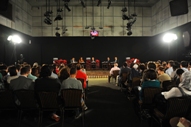 HEBA MORAYEF
HEBA MORAYEF
No, and they're planning to stay until June 2013, and we can't afford this. We can't afford to have Maspero happen again. We can't afford those problems.
TIM SEBASTIAN
But look at what has happened in the nine months that they have. Look at the people who've been put on trial - the old dictator and his family put on trial. Ministers brought before the courts on charges of corruption. I mean, how much can you do in nine months?
HEBA MORAYEF
There hasn't been a process of institutional reforms.
TIM SEBASTIAN
And who else is there, anyway?
HEBA MORAYEF
.... and the problem here is that the military is centralising all decision-making and power in its hands.
TIM SEBASTIAN
Who else is there, anyway?
HEBA MORAYEF
The civilian government, the civilian government.
TIM SEBASTIAN
What civilian government?
HEBA MORAYEF
The caretaker government where reform-minded ministers have been unable to actually implement decisions that they....
TIM SEBASTIAN
And is that why they're voting 90 percent in favour of the army? That's what they think of the parties, isn't it!
HEBA MORAYEF
The army has been very successful at portraying itself.. . Speak to any political activist, anyone in a political party who's tried to negotiate with the SCAF over the past months to actually get the SCAF to listen to what's in the interests of political parties: the SCAF does not consult. The SCAF does not involve people in its decisions. And the SCAF is clinging to power. And this is the fear.
TIM SEBASTIAN
All right. Heba Morayef, thank you very much indeed. Now please let me ask Gamal Abdel Gawad Soltan to speak against the motion.
Gamal Abdel Gawad Soltan
Speaking against the motion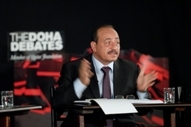
GAMAL ABDEL GAWAD SOLTAN
The motion is about reform and I believe we shouldn't deal with reform in abstract terms, we should be dealing with reform within a specific background, a specific complex political and social reality in this country. This reality that was created in the aftermath of the 25th January revolution, revolutionary developments earlier in the year, unleashed a number of major trends. I would identify three of them and within them we can judge what kind of role is played by the army in this environment. One trend is political reform. There is approaching democracy. After the collapse of Mubarak's regime, the dismantling, at least momentarily, of the operational machinery of Mubarak's regime and the re-politicisation of a large segment of Egyptian society, the political landscape in Egypt has changed and there is definitely a possibility of reversal, of going back to some sort of authoritarian regime like that of Mubarak is impossible, and democratisation is a must and inevitable in this country. A second trend here is the rise of the Islamic forces of all kinds - moderate Islamist and radical Islamist. And I would say that Islamists have been the biggest winner of those changes and developments that have taken place in the country early in the year. And the third trend is the bringing the military back to the centre stage of politics in Egypt. The military in the past decades in Egypt have been always there but somewhere over the horizon. Now it is back to the centre stage. Trend Number 1 is positive: a possibility for democratisation. The other two trends - Islamism and the military - I would say are not really conducive for democratisation, military and Islamism by definition, or at least we have doubts about their democratic credentials. And within this complex reality we have to...
TIM SEBASTIAN
Could you come to a close shortly, please?
GAMAL ABDEL GAWAD SOLTAN
I'll come to a close. That the major challenge that we are facing in this country is the weakness and the fragmentation of this organisation of the genuine democratic civil forces of the country, liberals and left. And some sort of role of balancing is needed, and this is the role that the military is playing in Egypt right now, leading it towards some sort of a gradual reform in a safe way, not to allow some specific act or exercise of hegemony over the rest of the country.
TIM SEBASTIAN
Professor Soltan, thank you very much indeed. Where is the military leading the country when it keeps changing the dates of elections and refuses to lift the emergency powers, which was their promise and was the major demand of the revolutionaries, wasn't it?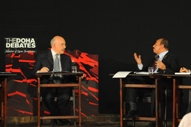 GAMAL ABDEL GAWAD SOLTAN
GAMAL ABDEL GAWAD SOLTAN
Well, there is a learning experience the military is going through. And also the other political forces are going through a similar experience.
TIM SEBASTIAN
So you're saying that the military don't understand what they've been asked to do by the revolutionaries?
GAMAL ABDEL GAWAD SOLTAN
The thing here is, if I look at the demands that were made at the military early after the revolution, there were demands to extend the transitional period for the military to stay longer.
TIM SEBASTIAN
They promised elections to civilian rule in six months.
GAMAL ABDEL GAWAD SOLTAN
And there was demand and the criticism made by liberal forces, and many people of reform mind wanted the military to stay longer in power to allow the new parties a bigger chance to organise to lead for the gradual...
TIM SEBASTIAN
So this is just 1952 again, isn't it. The military comes in, promises a swift transition to democratic civilian rule. Six decades later you're stuck with the military still. It's just the same, isn't it?
GAMAL ABDEL GAWAD SOLTAN
Luckily, luckily a replica of 1952 is impossible. The Egyptian society has changed. There is no room now for a new authoritarian regime in Egypt.
TIM SEBASTIAN
But what are people to make of the fact that they keep giving deadlines and then changing them when they feel like it, without consulting anybody?
GAMAL ABDEL GAWAD SOLTAN
This is a part of the messy situation we are living in in Egypt right now. And definitely this is part of the management of ...
TIM SEBASTIAN
Just a "messy situation"? It's a bit more than a messy situation. The army knows perfectly well what it's doing - it's been in power for sixty years.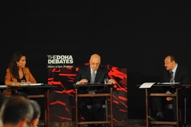 GAMAL ABDEL GAWAD SOLTAN
GAMAL ABDEL GAWAD SOLTAN
I don't think so. I think believing that somebody almighty, knowing everything...
TIM SEBASTIAN
Aren't they the most experienced politicians in this country?
GAMAL ABDEL GAWAD SOLTAN
... proved wrong with the failure and the collapse of the Mubarak regime. Egypt is so complex to be controlled by any one entity, including the army. And assuming that much about the army, I think, will not be fair to understanding the reality, not to the army.
TIM SEBASTIAN
All right. Professor Soltan, thank you very much indeed.
SAMEH SEIF-ELYAZAL
I have a comment, please.
TIM SEBASTIAN
Can I ask you to have a comment in a little while
SAMEH SEIF-ELYAZAL
Oh, sure
TIM SEBASTIAN
in the course of the questions? Otherwise we'll have to change the format and give it to everybody. SAMEH SEIF-ELYAZAL
That's fine.
TIM SEBASTIAN
Can I just remind everybody that the motion we're discussing tonight is that this House believes the Egyptian military is not interested in genuine reform. We're ready to take your questions. There's a lady at the back there. Yes, you. We'll wait to get a microphone to you, please.
Audience questions
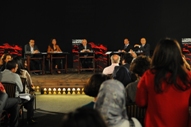 AUDIENCE (F)
AUDIENCE (F)
I would like to thank everybody for their wonderful comments and statements. My question is a little bit away from military practices.
TIM SEBASTIAN
I hope it's relevant to the motion and the discussion?
AUDIENCE (F)
It is relevant to the motion. I'm wondering, my question goes to those against the motion. How committed is the military to paving the way for any economic reform? Because we've seen that poverty is one of the major factors that impedes the transition to democracy. And as a result we haven't seen that at all. We haven't seen any signs of any kind of support the military's giving or any roadmap that's allowing to happen economically, on an economic ground.
TIM SEBASTIAN
Okay, General Elyazal.
SAMEH SEIF-ELYAZAL
A quick comment. I'll answer your question right now. Quick comment for a couple of points before I start this, if I may?
TIM SEBASTIAN
I think you're going to anyway, aren't you? You'll weave them into your comments. (Laughter] So we might as well get them out of the way first of all.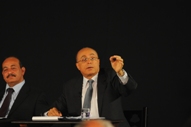 SAMEH SEIF-ELYAZAL
SAMEH SEIF-ELYAZAL
With your permission Tim, with your permission. Thank you very much for allowing me that. Heba mentioned something about emergency law, I'd like to remind everybody here, including you, because as well you mentioned something about emergency powers, emergency law as well ,that, yes, emergency law is there, it's still there up till now. And I am personally very much against any specific law. I mean, I am with the normal law, but not with any other law. The point is with that emergency law, which I am against, not a single case has been filed to any Egyptian whether it's thugs carrying arms, killing people, kidnapping people, ransom, whatever, all this , not a single case to a civilian court or a military court under emergency law, period. If anybody knows one, name one. Name one.
HEBA MORAYEF
I have cases.
TIM SEBASTIAN
Well, Heba Morayef doesn't agree with that.
HEBA MORAYEF
Emergency law, state security laws especially was created as an emergency law.
SAMEH SEIF-ELYAZAL
Name one. No, no, no, no, no. Excuse me. Not a single case from that time.
HEBA MORAYEF
The Israeli embassy break-in, the Minya sectarian violence..
TIM SEBASTIAN
Please let her reply. Please let her reply.
SAMEH SEIF-ELYAZAL
I want to know if one case has been sent to any court in Egypt.
HEBA MORAYEF
These are all cases. The Imbaba case. The Imbaba violence cases before the emergency state security law. The Minya Abu Qurqas. This is a...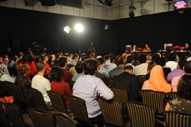 SAMEH SEIF-ELYAZAL
SAMEH SEIF-ELYAZAL
You've got to understand the difference between military law and emergency law, I'm sorry.
HEBA MORAYEF
They were questioned by Military Prosecutors and they're being tried, there have been three sessions before emergency law state security courts - courts created under the emergency law which do not provide the right to an appeal.
SAMEH SEIF-ELYAZAL
Sorry to tell you that you haven't seen anything about emergency law. You know why? Because emergency law is civilian law.
HEBA MORAYEF
I'm not questioning that.
SAMEH SEIF-ELYAZAL
So you cannot be questioned by a Military Prosecutor and be sent to a civilian court. No way. Because emergency law is a civilian law.
HEBA MORAYEF
With the Israeli embassy break-in, detainees were questioned before the Military Prosecutor and before the State Security Prosecutor. The State Security Prosecutor, Hisham Badawi, referred the case to the court.
SAMEH SEIF-ELYAZAL
That's not emergency law.
TIM SEBASTIAN
Okay, could I just say something. I don't want to get us too tied up in military and court procedures.
SAMEH SEIF-ELYAZAL
Okay. But I'm responsible for what I'm saying, Tim, in front of the audience, on air: not a single case has been filed to any Egyptian under any circumstances under emergency law. Period.
TIM SEBASTIAN
I understand that. Can we go back to the question that the lady put at the beginning, which was about the economy? Professor Soltan first.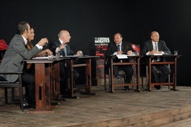 GAMAL ABDEL GAWAD SOLTAN
GAMAL ABDEL GAWAD SOLTAN
I don't think that we should expect and we should demand economic reform from the military. The military should be here for the briefest period of time possible. And this is up to us as a civil society and different political ideological forces to debate what kind of political reform we are needing. "Political reform" is a very big word.
TIM SEBASTIAN
You're saying that the military shouldn't bother with the economy?
GAMAL ABDEL GAWAD SOLTAN
I think we shouldn't demand that from them. It is our role...
TIM SEBASTIAN
They rule the country.
GAMAL ABDEL GAWAD SOLTAN
Who is?
TIM SEBASTIAN
They rule the country. They shouldn't be bothered about the economy?
GAMAL ABDEL GAWAD SOLTAN
No, their mission is to take us from....
TIM SEBASTIAN
They've got 40 million poor people in this country!
GAMAL ABDEL GAWAD SOLTAN
Their job is to take us from here to a functioning political representative system. This is their function. And it is our role ...
TIM SEBASTIAN
We won't get there unless people have food in their stomach, will we?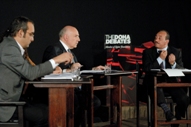 GAMAL ABDEL GAWAD SOLTAN
GAMAL ABDEL GAWAD SOLTAN
Just keep the things going: I mean, provide food for people, keep the economy going, but reform towards which ideological lines, which policy lines, this is not something that we should...
TIM SEBASTIAN
Okay, I want the questioner to come back and have a say on that. What do you feel about that answer that you got?
AUDIENCE (F)
I'm not convinced at all. And as we've seen right now at the moment, right before elections, we've seen a lot of demonstrations that are taking the same form of, you know, they're strikes more than anything else, including the ones inside the actual Ministry of Interior. Which is pretty interesting that, yes, people do need to be guaranteed somehow, they need to see a roadmap economically for them to be able to even think or make up their mind about which political party they want to belong to, whatever it is.
TIM SEBASTIAN
Even in this transition period?
AUDIENCE (F)
Absolutely. Absolutely. If the military said that it wants to make sure that there is democracy and a democratic transition, which first that is elections, then people have to be able to be convinced to participate in elections. And in order for them to participate in elections, they have to be able to reassure economically.
TIM SEBASTIAN
Yes, okay. General Elyazal, do you want to answer that?
SAMEH SEIF-ELYAZAL
I'll make you happy. Don't worry, I'll make you happy now. I know what you want to know. I'll give you an example. The economy is a very crucial thing, and we have a big issue, and it has to be solved. But it's not a kind of problem which you can solve in 24 hours or a couple of months, or even eight months. The issue is big and you need time to do it. I'm not saying that you don't have to do it, you have to do it yesterday, starting from yesterday, not from today.
MOHAMED FAHMY MENZA
Well, have you done anything about it? I'm sorry.
SAMEH SEIF-ELYAZAL
I'm telling you. Are we allowed to cut each other?
TIM SEBASTIAN
Yes, absolutely. Oh yes. [Laughter] I think you were the first one who did it, actually. [Laughter] I think you were the first one who did it.
SAMEH SEIF-ELYAZAL
[Laughs] I'm going to do that anyway! [Applause] Anyway. Just give you an example, quick example.
TIM SEBASTIAN
Quickly, please.
SAMEH SEIF-ELYAZAL
Very quickly. We have eight million civil servants in this country working for government, all right? 90 percent of them are taking salaries like 300 or 400 (Egyptian) pounds a month, which is nothing - it's less than $100. Not fair. And these guys are doing double-shifts somewhere. That's why they go in in the morning, they don't work, because they know that they have to go on night shift - they have to work. So they are giving 10 percent of their power in the morning and then...
TIM SEBASTIAN
I need to bring in somebody else. Because there's a lot of questions for all of you.
SAMEH SEIF-ELYAZAL
If you'd like to give them 4,000 pounds a month to be happy - and that is the normal fare - you'd need 24 billion Egyptian pounds a month to satisfy them. This is the kind of economy we have.
TIM SEBASTIAN
Okay, Mohamed Menza.
MOHAMED FAHMY MENZA
Thanks. I just want to thank Dr. Gamal for raising this point, because this is exactly the kind of discourse that the military is championing. They're saying that "Do not care about the economy now. We pay much attention to social justice. What we will do is that we will give you a parliament" which will be expectedly a fragmented parliament, "we'll give you a constitution in a year. And then we'll give you a president God knows when." And we're supposed to sit there and watch for the actions of the military. Ladies and gentlemen, what's happening right now, this is a clear case of bad management. You know, the management of this country right now is in turmoil. The ministers have not been able to perform as they should. And it doesn't seem that there's a plan for this country. What these people in the factories, in the farms, all over Egypt, what they're requesting is a clear timeline, a plan. People are not expecting that tomorrow they'll wake up and everything will be great. You know, people are not really that naïve. What they want is a plan, a clear-cut strategy for reform in this country.
TIM SEBASTIAN
Okay, all right. We're going to take another question. A lady in the second row. 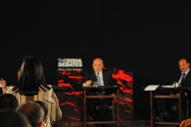 AUDIENCE (F)
AUDIENCE (F)
Thank you very much. My question here is: why are we trying to compromise again? Our generation has compromised for a long time. Then those youth came and made the revolution. We're trying again to compromise and understand why should we permit the military to continue? Military by nature, by breeding, are not qualified for political process and for running this country. Let's move to a civilian government, a civilian rule, and we'll take the risk. And in that case...
TIM SEBASTIAN
And your question is what - why are they still in power?
AUDIENCE (F)
Yes. Why are we still trying to give excuses? We'll take the risk of a civilian rule. And the second thing, if they are genuinely believing in reform, why don't you authorise the government and do deliverables for them, and then we can hold them accountable.
TIM SEBASTIAN
General, do you want to comment on that?
SAMEH SEIF-ELYAZAL
Yes, sure. First of all, they're not running the show. The government is really the people that are running the show. And I'm seeing the Prime Minister and the Prime Minister has the full power to do that. This is how it happens every day.
HEBA MORAYEF
It's not. It's not.
SAMEH SEIF-ELYAZAL
There is no one general is going to a Minister of Trade and telling them, "Minister, please stay away. I'm going to run your Ministry today." They are not doing that.
TIM SEBASTIAN
The audience looks a bit sceptical, I have to say! [Laughter] I have to say.
SAMEH SEIF-ELYAZAL
It's a free country, they can do whatever they want! [Laughs] I'm happy with that. But..
GAMAL ABDEL GAWAD SOLTAN
I need to intervene.
TIM SEBASTIAN
No, I think we need to hear from the other side, actually.
HEBA MORAYEF
I mean, the government can't even resign - it's not even allowed to resign. [Laughter] So it has no powers. Ask anyone. [Applause]
TIM SEBASTIAN
Would you like to answer that one?
SAMEH SEIF-ELYAZAL
Yes, definitely. Now, one thing I want you to know: that they don't want to stay in power. They are fed up. And believe me, I know that quite well. They want to go yesterday, not tomorrow. So that extending the period is not in their favour, at all. But the point is, as Dr. Gamal said, and I want to emphasise this point regarding - and Tim said that as well - that six months was the time for election and they didn't do it. Because people wanted that. Because, again Heba said that they are not listening to any parties. They are sitting, and this is published daily in the newspapers that they're sitting with the leaders of the parties, and with the leaders at the political...
MOHAMED FAHMY MENZA
I would like to really object to this. I'm really sorry, but this is not happening.
SAMEH SEIF-ELYAZAL
And the same happens every week! ... was there, and he was talking to the people last week. And not only that.
TIM SEBASTIAN
Okay. General, can we let Mohamed Menza in.
MOHAMED FAHMY MENZA
You're talking about cosmetic dialogue that's been implemented by people from the SCAF and certain personnel from the parties. This is not political participation. This is not joint decision-making. This is cosmetic processes for the media to come and see, and do what? And do what?
SAMEH SEIF-ELYAZAL
They were listening to them. It's not cosmetic. For them to give ideas. If we don't want election now because the new parties are not ready, please give us some time. Of course we're going to talk with the people...
MOHAMED FAHMY MENZA
Of course they're not ready, because they have been just established.
SAMEH SEIF-ELYAZAL
And then have the election. And they said: "Instead of six months we'll give them some more time to have some power and to talk to the people and to get some... "
MOHAMED FAHMY MENZA
And you think political parties will have power in six months from today? Don't you think political parties need much more time to really work and establish themselves and spill over the country. What's happening is that what we are being given is a rubber stamp. We're being given this so-called "political process of openness" with these weak political parties, this upcoming parliament, and that's it. That's it. This is all that we're getting from the military. From before, it was very clear, with a very simple example, like electoral law, for instance. Each and every political entity in this country has specified the need for a simple electoral law, and the military still went ahead and did what it wanted.
TIM SEBASTIAN
Okay, Professor Soltan.
GAMAL ABDEL GAWAD SOLTAN
Yes, this is the thing. I mean, yes, political parties have demanded a specific kind of electoral law, where MPs are selected by party lists. But once two-thirds of the MPs are to be selected by that, we see political parties having difficulty, feeling: "This is a problem here." The problem that we're having, a political vacuum and political weakness, particularly at the side of the people who are supposed to be genuine forces for democracy. This is the dilemma that we are having in society. And we cannot ignore that at all.
TIM SEBASTIAN
Okay, all right. I'm going to take a question from the gentleman in the front row. Could we have a microphone in the front row - here, please? 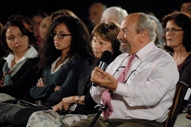 AUDIENCE (M)
AUDIENCE (M)
Well, thank you very much. My question is to General and Gamal. If the military are not interested in staying in power, why are they making the situation more likely to be either taken by the Islamists or by the remnants of the NDP? So there is a way that seemed to be, and I'm as sceptical as many people here, that the military is creating a situation in which people will find that the bare alternative to the return of the Mubaraks or the takeover by the Islamists is to stay with SCAF. What would you say to that: is there any truth in your mind, in your heart, to that claim? And if there isn't, tell us why.
TIM SEBASTIAN
SCAF being the Supreme Council of the Armed Forces to our viewers who may not know the term.
GAMAL ABDEL GAWAD SOLTAN
Let me give this, please.
SAMEH SEIF-ELYAZAL
And after that I'll have a couple of words, please. [Laughter] If I may.
TIM SEBASTIAN
With that, then have a couple of words.
GAMAL ABDEL GAWAD SOLTAN
With due esteem, I never said that the military is not interested in power.
SAMEH SEIF-ELYAZAL
Whoops!
GAMAL ABDEL GAWAD SOLTAN
Wait a minute.
MOHAMED FAHMY MENZA
I think you should be on our side, Gamal! [Laughter]
GAMAL ABDEL GAWAD SOLTAN
No, no. No, this is not true! Let me make my statement clear.
TIM SEBASTIAN
You can walk round now! [Laughter]
GAMAL ABDEL GAWAD SOLTAN
The problem is how we identify the situation. It is a situation sometimes identified as if there is political forces there that is demanding democracy and there is the army that is entrusted to prepare democracy for us. The way I see it is that I see the army as one of those parties, competing parties, they're trying to develop some sort of a compromise, understanding, based on power struggle and on consensus etc. towards building some sort of a functioning political system. The army is an actor among others, and this is how we should perceive it. And in this case, whether it will be staying in power, it cannot stay in power alone. What can it..
TIM SEBASTIAN (to questioner)
Are you impressed with what you're hearing?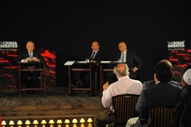 AUDIENCE (M)
AUDIENCE (M)
Not quite. With my due respect for Gamal, no, I'm not.
SAMEH SEIF-ELYAZAL
Can I comment on that, very quickly?
TIM SEBASTIAN
I just want to hear why you're not impressed.
AUDIENCE (M)
Well, because I see a lot of evidence to the contrary. And I feel and I see, and many people see, that the SCAF is creating an untenable situation for the public in such a way. And I've already begun to see in the papers, in talk shows, demands for the military to stay in power longer in order to save the country from either the Islamists or the return of the NDP, the Mubaraks.
TIM SEBASTIAN (to questioner)
And you feel that that situation has been intentionally manipulated? This is what you're saying?
AUDIENCE (M)
Well, you know, it looks that way.
TIM SEBASTIAN
Okay. General. Do you want to reply to that?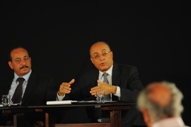 SAMEH SEIF-ELYAZAL
SAMEH SEIF-ELYAZAL
Very quickly. What you're saying is understood. And I have heard it like a million times. I mean, I'm every day in seminars, I've heard it many times. Every day I have the same idea. The point is, I have heard it from somebody else who wants the military to stay and they say, "This is the only solution. To get stability for this country, to get security in place, is to have them more, for another year or a couple of years." So 85 million people, you cannot say that everybody wants the military to get out. So this is the reality, number 1. Number 2... You mentioned something...
TIM SEBASTIAN
Very, very quickly. We can't go through 1, 2, 3.
SAMEH SEIF-ELYAZAL
You mentioned something about a conspiracy theory. I'm very much against the idea of conspiracy. I mean, every time it's said, "Ah, they want to do that because they want to stay!" They don't want to stay, period. And the point - okay, that's enough? All right.
TIM SEBASTIAN
That's it, thank you very much.
MOHAMED FAHMY MENZA
I just want to really comment real quick. I don't think that the comparison between the military as an actor that's equal to others actors on the scene is really logical. Because apparently the military is the only institutional entity that's still capable of being an entity and institution with the ability to use force, which is not at all in the equation of any other political entity. And a question really to what General Sameh said: so if I get you right, what you're saying is that if the people want the military to stay in power, they will stay in power?
SAMEH SEIF-ELYAZAL
No.
MOHAMED FAHMY MENZA
So what's the point of people having this popular need for the military to stay or...?
SAMEH SEIF-ELYAZAL
Because the country's not stable. Security - they said the security need discipline. And the police force cannot put security in place. That's why they want the military to stay more, at least to get some security there.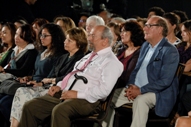 MOHAMED FAHMY MENZA
MOHAMED FAHMY MENZA
Ah, you say "more". Not forever.
MOHAMED FAHMY MENZA
Yes. It's not my idea - people have said that!
TIM SEBASTIAN
And so, the army is, if you're to be believed, champing at the bit to get out of power?
SAMEH SEIF-ELYAZAL
Yes, absolutely.
TIM SEBASTIAN
Which is why they keep extending the date for the election?
SAMEH SEIF-ELYAZAL
No, no, they have been forced to extend it by the political groups in Egypt.
TIM SEBASTIAN
They have been forced to?
MOHAMED FAHMY MENZA
This is not right, by the way. This is not right. Not just because one or two people said that the so-called political forces are calling for .. I really don't think that the viable political forces in this country are calling for the military to stay.
GAMAL ABDEL GAWAD SOLTAN
The Muslim Brothers didn't say ...
TIM SEBASTIAN
Okay. Thank you very much. I'm going to take a question for this side, for those who are in favour of the motion. Can we have a question to them, please? Lady in the front row, if we can get you a microphone.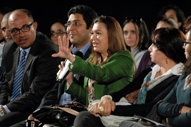 AUDIENCE (F)
AUDIENCE (F)
Well, now, if you're claiming that the people earned every step that happened since January 25th, why couldn't we see the people fighting for the two most important things: food and security? Just saying to the army, "You shouldn't do this and you shouldn't do that" is only destructive. Now, in points, please, in very clear points and specific, what are the steps that we should see the military doing today? And just one question to the other side, please.
TIM SEBASTIAN
Let's do this one first. Let's do this one first.
HEBA MORAYEF
Well, I mean, let me just take on your comment. Are you not seeing the hundreds of thousands of people participating in labour protests over the last months?
AUDIENCE (F)
Is this the way they can get food?
HEBA MORAYEF
You're saying why aren't people... But of course, it's all about poverty!
AUDIENCE (F)
"Give us money"?
HEBA MORAYEF
It's all about socio-economic conditions: "Give us money"?
AUDIENCE (F)
Just be in the street and saying, "Give us money"?
HEBA MORAYEF
Look, these strikes are a reflection of the fact that there is a very serious socio-economic problem here. And this is what the military's actually listening to but failing to actually address. There is no policymaking around the strikes. They pass a law criminalising participation in strikes. They've broken up at least 11 strikes and labour protests in the past months using force. They've tried on three occasions strike leaders and given them suspended sentences. They want the strikes to stop! This is not economic management. This is not economic management.
TIM SEBASTIAN
The question was what do you want the military to do? The question was what you want them to do. You've told us what you don't want them to do.
HEBA MORAYEF
This is not economic management. They have to come up with an economic policy that will actually address this. They have to realise that the economic situation is also about investor confidence in the Egyptian political system, that it's about rule of law, that's it's about the courts functioning, that the longer they cling to power, the less investors will want to come. That the more they incite xenophobia...
TIM SEBASTIAN
Okay, I'm going to move on to give the questioner a chance to come back here.
GAMAL ABDEL GAWAD SOLTAN
This is contradictory in terms. Demanding the military to leave and demanding...
TIM SEBASTIAN
Excuse me, Professor Soltan, let me just give the questioner a chance to come back on this.
AUDIENCE (F)
The same point?
TIM SEBASTIAN
Yes, do you want to - do you accept?
AUDIENCE (F)
I mean, again, are we supposed to wait for the economic report to be implemented by the army?
MOHAMED FAHMY MENZA
Okay. We're not talking - I'm sorry. Let's just clarify one thing here. I don't think anyone here in this room, or even all over the country, is really thinking that tomorrow Egypt will be fine economically. What we're talking about is a clear timeline and plan. And I think for the most part the military has failed miserably in delivering this plan. Give me a plan. Those people...
AUDIENCE (F)
What do we expect? Now, what do we expect - a plan?
MOHAMED FAHMY MENZA
Those people - I'm sorry - in the factories, in the factories. If they wake up tomorrow and they know that they will get the right in a week, in a month, in a year, if they see a reform plan, believe me, they will be satisfied. And the country will run smoothly. I cannot simply think in terms of "These are the cause of trouble - shut them out. Stop them."
TIM SEBASTIAN (to questioner)
Have one more return to that, and then we must go on to other questions.
AUDIENCE (F)
Okay. I just have another question for the other side.
TIM SEBASTIAN
Briefly. You're the only one who'll put two questions to them.
AUDIENCE (F)
Yes, very briefly. Actually if we do that and - if we are expecting a plan, if we get the plan from the army - so if it's a good plan they should stay. The plan is not from the army. On the other side. On the other side.
MOHAMED FAHMY MENZA
Why should they stay if it's a good plan? They are mandated by being the only force in the transitional period to give us a plan. It doesn't mean that they will do it.
AUDIENCE (F)
I'll just say the question very briefly. Now, the first step to get reform and elections is security in the streets. Why can't the army - why did it fail to get the security in the street? It's either they don't want, and it's very bad, or they are not capable, and then it's a catastrophe because we cannot trust the army to get the security in the street.
TIM SEBASTIAN
General.
SAMEH SEIF-ELYAZAL
Right. Again, before I get to that, one quick... One quick.
TIM SEBASTIAN
No, no, not yet! [Laughter] No, no. No, no, otherwise we'll never get to the question. No, please.
SAMEH SEIF-ELYAZAL
I want the other side to tell me how to get rid of the poverty in Egypt.
TIM SEBASTIAN
No, no, please. Okay. Please answer the question.
SAMEH SEIF-ELYAZAL
Yes, security's a big issue.
MOHAMED FAHMY MENZA
Are we supposed to respond to this, or is it a question just for...?
TIM SEBASTIAN
Please. You'll have a chance. Please answer the question that you were asked.
SAMEH SEIF-ELYAZAL
Okay. Security's a big issue, definitely. Police are not capable to do it. They need..
TIM SEBASTIAN
What about the army. Is the army capable?
SAMEH SEIF-ELYAZAL
They need help from the army. And that's why...
TIM SEBASTIAN
Is the army capable of doing it? Because they're not doing it. That was the question. That was the essence of the question. Why are they not doing it?
SAMEH SEIF-ELYAZAL
There is a very sensitive issue here.
TIM SEBASTIAN
Either they don't want to or they're incapable. That was the question.
SAMEH SEIF-ELYAZAL
The point is to put security in place you need to use power sometimes. And people here will not accept that. Aggression is something which nobody will accept.
TIM SEBASTIAN
Nobody would accept it? We just saw 25 dead in the..
SAMEH SEIF-ELYAZAL
That's why people are still working right up to now - that's why they've got to do it again. So now you don't use aggression because "aggression is against everything, and we don't want." The other side said we need security now. Security is not like "Please go ahead" for the thugs and they will leave their arms in the street and go. They need somebody to turn them out and to take them and arrest them and put them in jail. I'm talking about thugs - not politicians. Thugs who carry actually knives, swords and machineguns and threatening everybody in the street.
TIM SEBASTIAN
Okay, all right. Gentleman in the front row there.
AUDIENCE (M)
I would like to ask the for people: what do you think is the next step? Let's assume that the military failed in everything as you said and we will oust them..
MOHAMED FAHMY MENZA
We didn't say that. I didn't say that.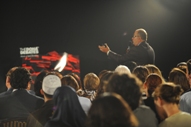 AUDIENCE (M)
AUDIENCE (M)
..and will bring another one. Who is that one, and who is that foundation? And assuming that you approve this foundation, you will approve - and what about the election: are we going to vote for that foundation you chose? If we give a mark out of 10 for the military as a trustworthy foundation, do we have any other foundation to give them a higher mark regarding the trust of leading the transitional period?
TIM SEBASTIAN
Okay, Mohamed Menza.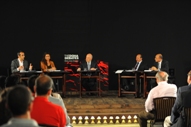 MOHAMED FAHMY MENZA
MOHAMED FAHMY MENZA
Thanks, I got the question. Thanks for your question. I think it's a very important question. But I don't think it's the right question to ask, to be honest. I mean, the military have been mandated with the responsibility of leading the transitional phase: which means that, by virtue of the role, is to put the establishment for the country afterwards. We're not talking about another power that will take their place and rule the country for God knows when. And we're not talking about foundations either. We're talking about a people, a society that has been put under extreme measures of repression, and repression for a very long time. And now it's about time for the people actually to take rule. People through what? Through political parties, through NGOs, associations, political groupings, syndicates. You know, open the room for these different entities to actually play a role in the country and not end their activities. We're not talking about, "All right, the military goes now." No, we're saying that the military have been mandated and delegated with a certain responsibility of proper management and establishing the basis for a transitional phase.
TIM SEBASTIAN
So you're saying it's not a question of who could do it better?
GAMAL ABDEL GAWAD SOLTAN
Tim, Tim!
TIM SEBASTIAN
Excuse me. You're saying it's not a question of who can do it better?
MOHAMED FAHMY MENZA
It doesn't have to be, no. It's a question of what should be done and why isn't it being done?
TIM SEBASTIAN (to questioner)
Please, would you like to come back on that?
AUDIENCE (M)
Do we have the right to vote for anybody who will lead the transitional period?
HEBA MORAYEF
Yes, but this is what we need. We need clarity, we need a timetable. We can't afford to have the military remain in power until June 2013. We need early presidential elections and we need a parliament with powers - the power to appoint a government, the power to decide what position the military should have in the constitution, what oversight parliament should have of military budget. Not a military that remains in power while these key decisions are made about the future of the country. This is what we need. The transition's really...
TIM SEBASTIAN
Okay. I'm going to take..
GAMAL ABDEL GAWAD SOLTAN
I need to comment on this, please.
TIM SEBASTIAN
You can have a brief comment, and then I'm going to go to a questioner - the gentleman in the third row there.
GAMAL ABDEL GAWAD SOLTAN
Yes, the terms used here about that the army has been mandated and delegated to perform so and so - this is apolitical; this is not a political understanding of this reality. You cannot delegate an army to do the job for somebody else. The fact that the army..
TIM SEBASTIAN
Why not? I mean, in a lot of countries the military serves the politicians.
GAMAL ABDEL GAWAD SOLTAN
In democracies, this is done with the military. We want to do it, but in reality, in the current reality, we are not yet there. And once the military is in power...
MOHAMED FAHMY MENZA
I'm sorry, but don't you think that the legitimacy of the military has come from the people?
TIM SEBASTIAN
We can't hear.
GAMAL ABDEL GAWAD SOLTAN
We need to defend the situation this way.
TIM SEBASTIAN
Okay, let him reply to you.
MOHAMED FAHMY MENZA
What kind of legitimacy do you think the military had on February 11th to rule this country? Hasn't it been stemmed from the people, hasn't this legitimacy come from the people? If it weren't for the revolution, were the military to rule us now? Answer the question, I'm sorry!
GAMAL ABDEL GAWAD SOLTAN
I think the people and the revolutionary forces, the revolutionary forces should have been in power by themselves...
MOHAMED FAHMY MENZA
Answer the question! Answer! The answer was no, there is the people!
TIM SEBASTIAN
We can't have everybody speaking at once.
GAMAL ABDEL GAWAD SOLTAN
..and the fact that they didn't take it reflects that we are not a fully-fledged revolution. And there are some kind of new factors there, the things that came with the revolution, and there is something inherited from the past to continue the political situation...
TIM SEBASTIAN
Okay. Heba Morayef. Let her answer.
HEBA MORAYEF
In March the military asked us what nationality we'd like our president to have, what nationality the spouse of the president should have. Why did 77 percent of the population vote on this provision if we're not going to see a president before our new constitution is drafted? That was the mandate given to the military: to shift to presidential elections. It then ignored the referendum and went ahead with constitutional change anyway. But that was what people voted for: a return to elections and transition.
GAMAL ABDEL GAWAD SOLTAN
What I'm trying to say here is that it's a power struggle between the different political forces and the military together to take us out of this transitional period. It's not the job of the military to do things for the others. This is the thing!
TIM SEBASTIAN
Okay. You've made that point. I'm going to take a question from the gentleman there.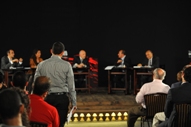 AUDIENCE (M)
AUDIENCE (M)
Okay, thank you. Good evening. My question to for. You raised the point of the economics and it's all about food and poverty and this stuff. Now, if the military came up with a plan, a long-term plan or even a short-term one, concerning economics and this stuff, aren't you going to object? You have your objections that they are not experienced enough to put this and to talk about economics and these stuff. And I believe the political parties, I believe you have to go deeper and deeper in people, not just the educated ones, not just the people right here in the debate.
TIM SEBASTIAN
Okay, let them answer the question. Heba Morayef.
HEBA MORAYEF
On economics I was very clear from the start. I want the Minister of Finance to be making the decisions, not the SCAF. I want the specialists to be making the decisions.
GAMAL ABDEL GAWAD SOLTAN
He is liberal. How about socialists?
SAMEH SEIF-ELYAZAL
The Minister of Finance is doing it every day.
TIM SEBASTIAN
Please don't shout against each other.
GAMAL ABDEL GAWAD SOLTAN
The Minister of Finance to get..
HEBA MORAYEF
.... army. Let me finish.
TIM SEBASTIAN
Let her talk. Let her talk. Please. Please.
HEBA MORAYEF
But beyond allowing the experts to make a lot of these decisions, I also want the military...
GAMAL ABDEL GAWAD SOLTAN
Experts? There is no expertise without ideologies.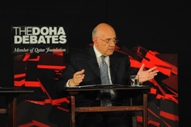 TIM SEBASTIAN
TIM SEBASTIAN
She let you talk. No, Professor Soltan, please. Respect the Chair. Please.
HEBA MORAYEF
I would also like the military to stop trying to ruin the tourist industry by stoking xenophobia all the time. This is really not good for Egypt's economy, to have all this incitement against "foreign hands" and then wanting temporarily to stop visas at the airport. I mean, I want the military to look at the economy, to do no harm, and to allow the caretaker government, which has some accountability to the public, who we can pressure to make...
TIM SEBASTIAN
Okay, all right. General Elyazal, you wanted to come back.
SAMEH SEIF-ELYAZAL
First of all, just a quick..
TIM SEBASTIAN
If your team member will let you! [Laughter]
SAMEH SEIF-ELYAZAL
[Laughs] Yeah, very quickly for Mohamed. They said about who gave the power to the military to stay in power? People gave them the power. You know why? Because they did not reject them. They were in the street. They were in Tahrir Square - millions of them there, twenty millions of people were there and didn't say no. In fact, they came and they kissed them, and took photos of them, and they were very happy about them. And you saw that everywhere. [Scattered applause] So I don't have to convince you about that, because pictures and videos and footage in the TV was very clear.
MOHAMED FAHMY MENZA
I'm not saying anything against that. I'm not saying anything against that.
SAMEH SEIF-ELYAZAL
Heba mentioned something. Can I..?
TIM SEBASTIAN
Yes, please. Let him finish.
SAMEH SEIF-ELYAZAL
Tim, I don't have more time?
TIM SEBASTIAN
You can finish.
SAMEH SEIF-ELYAZAL
Okay, thank you very much. Thank you.
TIM SEBASTIAN
You can finish what you were going to say. Please don't take too long.
SAMEH SEIF-ELYAZAL
I really appreciate it. Heba, she's saying about foreign hands. Yes, foreign hands are there. And any country doesn't want the stability of Egypt. If they're not going to play now against Egypt, when are they going to play? Security is not in place, stability is not there, the government is a very weak government and I know that, everybody knows that. And this is the golden time for them to come and do whatever they want. And that's why they are playing these games here.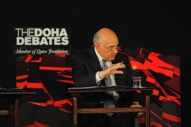 TIM SEBASTIAN
TIM SEBASTIAN
Exactly who would want to do a thing like that?
SAMEH SEIF-ELYAZAL
Five spies from Israel in six months. And Iranian diplomatic...
TIM SEBASTIAN
But you're getting 25 back of yours, aren't you?
SAMEH SEIF-ELYAZAL
[Laughs] We got more. Then the Iranian diplomat is working against the revolution in Egypt.
HEBA MORAYEF
And April 6th and Kefaya?
SAMEH SEIF-ELYAZAL
Hundreds of millions of dollars coming from many countries to support political groups.
TIM SEBASTIAN
Okay, all right. Heba Morayef, you wanted a word?
HEBA MORAYEF
I just think that the military's attempt to discredit groups like April 6th or like Kefaya with these accusations and this whole investigation into the human rights community receiving foreign funding - this is a whole part of the myth of the foreign hands that are out there. The problems are inside the country. It doesn't take foreign hands to cause a problem... [Applause]
TIM SEBASTIAN
Okay, I'm going to take a question from the lady right at the back. 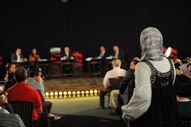 AUDIENCE (F)
AUDIENCE (F)
Well, my question goes to both sides. Do you think that common Egyptians, the majority, people on the street, have any choices? Because according to the actual scenario it's either SCAF, that they definitely respect, because by nature we respect military uniform, even if the person wearing it is not up to it. But we respect military by nature. There are Islamists and there are liberals and people in the street do not trust both of them. So they have only one choice to make, which is SCAF. So do you think Egyptians have any - common ones, not elite talking in air-conditioned rooms - the people in the street, do they have any choices?
TIM SEBASTIAN
"Is there any choice?" Mohamed Menza, do you want to take that one?
MOHAMED FAHMY MENZA
Thanks, yes. I just want to, real quick, just on the point that we were talking about, the military and that people want... This is exactly what we were saying. We were saying that by delegation, by empowerment, that the people empowered the military to actually undertake the objectives of the revolution. I think the military admitted that very clearly. I mean, they talked about the legitimacy of the demands of the people and what have you. So I don't think that this is something that we disagree with.
TIM SEBASTIAN
Come back to the question, will you?
MOHAMED FAHMY MENZA
Yes, sure. I was just about to. On the point of trust, I don't think really again it's a question of who runs the country. I think that there is a question of what needs to be done. And the military, again, in the position that it..
TIM SEBASTIAN
The question was whether people have any choice.
MOHAMED FAHMY MENZA
Well, with what's happening right now, the choices of the people are being limited. They're not really given the chance. And there is a responsibility, again, by the powers that were put in the hands of the military. Legitimacy, up till now executive, up till now no government almost - a very weak government. All of these authorities, then it's only logical that it will not be able to really handle all of these tasks. And the result is that people are not being empowered. Their demands are not being listened to. And believe me, with time, if this goes, that disagreements will continue.
SAMEH SEIF-ELYAZAL
Just one word. They want SCAF because they respect them. Because it's not like - because they got the victory on 6th October 1973. They respect the army, that's why they want them. It's not because...
TIM SEBASTIAN (to questioner)
Do you want to come back and answer that? Would you like to come back and answer that? Do you agree with the answer you got from either side? Please stand up.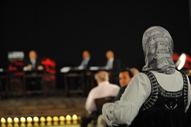 AUDIENCE (F)
AUDIENCE (F)
I do not agree with Mr. Seif-Elyazal or that gentleman. I'm not convinced at all. Because people need to eat, sleep, to find jobs, to get married. So they are looking for stability. And the army's the only source for this stability. And we do respect them by nature, maybe because it's propaganda: sixty years of military rule..
TIM SEBASTIAN
But are they giving you that stability? Do you feel you're getting that stability?
AUDIENCE (F)
Not me, but people in the streets, yes. They think that the army's giving the stability, so they have only one choice: only to choose the army.
MOHAMED FAHMY MENZA
I'm really sorry, but I'm not sure really what people you're talking about. I mean, I'm sure that there are of course segments within the Egyptian society that approve of the military.
AUDIENCE (F)
I'm talking about cab drivers.
MOHAMED FAHMY MENZA
But at the same time there are lots of people in several parts of this country who are entirely dissatisfied with the way this whole transitional phase has passed. And the sole responsibility in this goes back to the military.
TIM SEBASTIAN
Okay. I'm going to take a question from the gentleman in the front row there. If you would stand up, please.
AUDIENCE (M)
I just wanted to ask the panel: something that hasn't been discussed so far is foreign policy. And I think that..
TIM SEBASTIAN
Well, we're staying with the motion. So if you're not...
AUDIENCE (M)
Well, I mean, I think that a lot of Egyptians..
TIM SEBASTIAN
If the question is about this.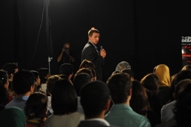 AUDIENCE (M)
AUDIENCE (M)
A lot of Egyptians consider foreign policy - there is a lot of protesters in front of the Israeli embassy who wanted the SCAF to change their foreign policy, particularly toward Israel. A lot of people consider this to be part of the reform that they're expecting from this government. Do you think that this record has been good in terms of managing some of the crises that have come up recently in terms of foreign policy?
TIM SEBASTIAN
General, do you want to take that?
SAMEH SEIF-ELYAZAL
Yes. No, I don't think they manage it well. I don't think the idea of giving a flat to a guy who climbed the 17 floors in ten minutes like a marathon and coming back with the Israeli flag is a good idea. That's why second time four of them went upstairs to get the flag, because four of them want four flags. So you can't reward people when they actually do something against the law. So I'm very much against how they dealt with it. They dealt with it with a very bad method. Not good at all. That's why another guy said, "Oh, let's set on fire in the embassy - maybe they will give me an entire building. If they give a flat for the guy who's going to get the flag, so maybe set fire to it - I'll get an entire building as a reward." It's wrong.
TIM SEBASTIAN
Professor Soltan, do you want to add something?
GAMAL ABDEL GAWAD SOLTAN
Yes, just to use this opportunity to show what the demands of the revolution are. Some of the revolutionaries demanded in this case the expulsion of the Israeli ambassador, maybe cut off the remuneration of the Egyptian Israeli peace treaty, etc. Others have other opinions. But this was a vocal one, and the military had to manage the situation, right or wrong. But they had to deal with a number of diverse demands. The thing with the economy, some people want something like a socialist economy.
TIM SEBASTIAN
Any sign that the military is interested in reforming foreign policy, was at the root of the question?
GAMAL ABDEL GAWAD SOLTAN
Well, yes, there are some signs. I would say, for instance, if we look at the recent prisoners exchange deal between the Palestinians and Israelis: Egypt mediated that. This is normal. But the thing is that the .. states was not really consulted or involved with it. This was the first time Egypt conducted some sort of major ... consulting directly.
TIM SEBASTIAN
Heba Morayef, do you want to come in on that?
HEBA MORAYEF
I think one of the constants is the 1.3 billion of US dollars that the military receives in military aid, which is about 20 percent of the military budget. And I think that's going to remain the constant throughout. And I think that's also perhaps why the SCAF feels that it can be secure in the knowledge that the international community is not going to pressure them into democratic or human rights reform: because the ultimate interest is ensuring stability in Egypt for geo-strategic reasons. So overall, no, I don't think ...
TIM SEBASTIAN
You don't think the West has learned any lessons from its policies in the past?
HEBA MORAYEF
No, no, we're hearing the same rhetoric as we heard last year: that stability is paramount. And what protesters wanted in January is secondary.
TIM SEBASTIAN
Okay. Question from the lady in the second row, please.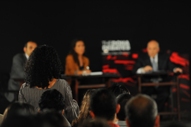 AUDIENCE (F)
AUDIENCE (F)
My question to the gentlemen against the motion. Don't you think that genuine reform would actually threaten the status of the military institution? They are currently untouchable. And don't you think that they have forced Mubarak to step down: they sacrificed one to keep the institution with its benefits, with its status, the same. And they are clinging to power not because they want to be at the head visible all the time, but they want to make sure that nobody threatens their interests, whether they're political, whether they're economic, whether they're security-related. Don't you think this is the real reason why they want to..
TIM SEBASTIAN
General Elyazal, can I come to you? Because a lot has been written in the press about the army's economic interests and we've seen estimates as high as something like 40 percent of the economy that they control in some form or other. How keen are they to protect their economic positions and their privileges?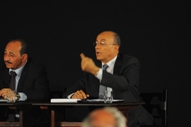 SAMEH SEIF-ELYAZAL
SAMEH SEIF-ELYAZAL
Okay. Let me correct first that it's not 40 percent. It's 16 to 18 percent. And it's only in a small industry. They don't have a cement factory or don't have a steel factory or car factories. What they have is bottled-water factories, olive oil factories, garment factories. So they're not interested - that's what they do. That's reality. And dairy products. So they are not running - there are no banks that belong to the army, there is no heavy industry or even mid-to-heavy industry that belongs to them. So what they do now is 16 to 18 percent only from very small industries which they are keeping. And most of it goes to special supermarkets, starting with they wanted to sell only these items to the military families, and then people said "No, we would like to buy it, because it's good quality with a good price." So everybody now can go and buy these kinds of things.
MOHAMED FAHMY MENZA
What about construction and arms...
SAMEH SEIF-ELYAZAL
One more thing.
TIM SEBASTIAN
Let him just...
SAMEH SEIF-ELYAZAL
I've nearly finished.
TIM SEBASTIAN
I'll give you a chance to finish, but...
MOHAMED FAHMY MENZA
I think there's an underestimation of the economic rule of the military in the country. We're talking about construction, we're talking about arms, we're talking about a lot of heavy industry that the army is involved in - you know, the military factories. They do also other things in addition to the supermarkets and the rice and...
SAMEH SEIF-ELYAZAL
Okay. So you don't want that we have military factories, because you want to buy all your arms from outside? So they are banned from trying to build their own military sites.
MOHAMED FAHMY MENZA
No, I'm not saying it should be banned. I'm just saying these things exist. I'm just saying that they exist. I'm not saying that they should be banned.
SAMEH SEIF-ELYAZAL
One more issue. As Dr. Saad (audience member) mentioned, yes, they do some contracting, and they do it very well. For instance, when you go to see the road from Cairo to Sukhna, it's the best, I think, highway in Egypt.
MOHAMED FAHMY MENZA
We're really not... I agree.
SAMEH SEIF-ELYAZAL
And it's built by them not because of making money but because of serving people. That's the idea. They have the service companies to serve people, not to make money. Well, they don't want to make money out of it. They don't have any privileges.
TIM SEBASTIAN
Please, let her... Heba Morayef.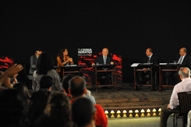 HEBA MORAYEF
HEBA MORAYEF
I think the question was also about the special protections that the military will want for its economic interests moving forward. I think it's interesting that they amended the Code of Military Justice to give Military Prosecutors sole jurisdiction over any charges related to corruption within the military. I think ......
SAMEH SEIF-ELYAZAL
Corruption in the military? Name one! [Laughter]
HEBA MORAYEF
I wasn't saying that. I was saying..
SAMEH SEIF-ELYAZAL
Corruption in the military?
TIM SEBASTIAN
Let her clarify, please.
HEBA MORAYEF
I was saying that the amendment to the Code of Military Justice said that any complaints related to corruption go to the Military Prosecutor. So the interest here is to centralise any of this investigation.
SAMEH SEIF-ELYAZAL
So they want to do it themselves? Because they're doing many corruption, they don't want anybody to know it, and that's why they're going to do it by themselves, just to hide it? Is that what you're saying?
HEBA MORAYEF
I'm saying that this is a reflection of the military's interests in preserving its own immunities. And General Mamdouh Shahin his comments back in June, I think, is very illustrative to this respect. He said that an army should not be subject to the whims of a new president, that you should have special immunities in the constitution, and that nothing related to the military budget should be discussed in the new parliament. I do see this as the army's attempt to protect its own economic interests.
SAMEH SEIF-ELYAZAL
What kind of immunity? They don't have any immunity. They're not even allowed to go to polls and put their votes. They are banned from that by law. They cannot vote for anybody. That's just the reality.
HEBA MORAYEF
And I hope it will stay this way. I'm just saying that these are the comments by General Mamdouh Shahin at the time in terms of the constitution going forward.
TIM SEBASTIAN
Okay, I'm going to take a question from the gentleman in the middle there. Yes, you, sir. Yeah.
AUDIENCE (M)
Thank you very much. I'll take it from General Elyazal for his comment on...
SAMEH SEIF-ELYAZAL
Seif-Elyazal.
AUDIENCE (M)
Seif-Elyazal, I'm sorry.
SAMEH SEIF-ELYAZAL
Seif-Elyazal is one word, by the way! [Laughs]
AUDIENCE (M)
All right, thank you very much for the clarification. I take it from your words that the military is serving the people, and by building this road to Ain Sukhna they are serving them to make it a better life.
SAMEH SEIF-ELYAZAL
They have been asked to do it. They don't run for it.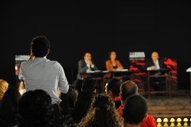 AUDIENCE (M )
AUDIENCE (M )
And I think that serving the people means listening to the people. And if you don't listen to the people, like Mubarak has done, then there's something bad's going to come. And I think the wisest and guided advised Mubarak to delegate authority to the armed forces, to SCAF in particular, which is against the constitution of 1971, was so smart. Because he knows well...
TIM SEBASTIAN
Can we come to a question, please?
AUDIENCE (M)
Sure. He knows well that people respect the military to an extent. But what I'm asking now is: if I am serving the people and I'm really looking for their needs and respecting the revolutionary demands, then why till today I don't see one single initiative from the military or the caretaker government, that supposedly are directing the country, to do so. So I would..
SAMEH SEIF-ELYAZAL
To do what?
AUDIENCE (M)
To do the reforms. To move on and give me a plan. At the same time, I have to say on the other hand that most of the political parties are fragmented in their leadership. And you have to realise that people were not going to wait for one single person - to Menza - to come to the street to talk to them. You have to go all and talk to them. Don't imitate the Muslim Brotherhood and imitate the military, just go ahead and talk to people.
TIM SEBASTIAN
All right.
MOHAMED FAHMY MENZA
We're not negating that at all. Actually I do agree with your points and I thank you for it. What we're saying is it's not really logical for the military, whichever authority in the country right now, to try and put these so-called political parties, which have been just established a few months ago, and say that "This is our political reform." This is not enough, by any means. This is not what the revolution wanted. This is not what the people that died, died for, really. It wasn't because we wanted some so-called political entity on the street. We wanted more real, genuine reform.
TIM SEBASTIAN
Okay. Professor Soltan, you wanted to come in on this?
GAMAL ABDEL GAWAD SOLTAN
Well, again, we need a better definition for the situation. The polemics are not really leading this country one step ahead. The fact is that the serious problem we're having is a fragmentation of the genuine democratic forces, and this is what leaves us with an unbalanced political arena, with the army and the remnants of the old regime on the other hand, and the Islamic forces on the other. We are squeezed in between those. And we have to think politically, not just in legal formal ways, about the role of the different parties, different actors, particularly the army. And I think if we begin as political parties and you are representing one of them, thinking this way, perhaps we'll be able to search to find a kind of a constructive compromise way out of this, rather than being squeezed in the middle of this dilemma. Because we have to stop blaming the others and we have to think about the reality.
TIM SEBASTIAN
Okay, all right. Mohamed Menza, come back briefly.
MOHAMED FAHMY MENZA
This is exactly my point, Tim, here. This is exactly my point. The military is saying that with these parties - that are not yet really a party; they're still in the process of building - we have reform. What I'm arguing for is that, no, this is not reform. And the actual forces that built, made this revolution are still not in these parties. It will take them a long time to be in these parties.
SAMEH SEIF-ELYAZAL
So it's their choice.
MOHAMED FAHMY MENZA
And it will take time, it will happen. So the equation - I'm sorry - the equation that you referred to is actually the military, the parties and the people. The people that made this revolution are not yet mostly in parties, are nothing with the military.
SAMEH SEIF-ELYAZAL
Okay, we cannot force them to do it.
MOHAMED FAHMY MENZA
I'm not forcing them. I'm saying listen to them. Listen to them.
GAMAL ABDEL GAWAD SOLTAN
I'm asking myself based on that, in the coming election when people are going to vote for simply the ... will draft our constitution, who will be elected if the revolutionary forces and new political parties are not ready yet? What kind of future is waiting for us as a country? This is my concern, and this is..
TIM SEBASTIAN
Okay, I'm going to ask the questioner just for some brief comment on what you've heard. Were you convinced by either side? AUDIENCE (M)
AUDIENCE (M)
Actually, no, because I didn't hear what type of serving the people comes from. You conscribe the Egyptian citizens to work or to serve in the military. Yes, it applies to me or others, but again I don't see a military that's really taking care of me. This is one point. And this is very important: if you're talking about a transition period, what have you done in the transition period? You open political parties to register? Well, some parties get rejected by the committee and they have to go to the court ruling. And..
TIM SEBASTIAN
Okay, all right, you've made the point. Do you want to come in there, General? Briefly. Briefly.
SAMEH SEIF-ELYAZAL
Yes, sure. It's only one party they did that. It's not every party. They do a 24 party, now 49. Only one case. Al Nour party is the one that went to.. A Salafi, yes. Al Nour. Two parties out of 29 parties, they went to court. But the rest, just a very smooth and easy way to do it.
TIM SEBASTIAN
Okay, I'm going to take one quick question from the lady in the front row, there. A brief question, because we're running out of time.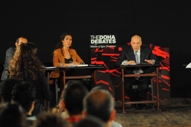 AUDIENCE (F)
AUDIENCE (F)
Yes, I'll ask the gentlemen. You argue that the military is interested in real reform. Very briefly, how can you explain crushing people by military cars at Maspero and attacks on media? Thank you. [Applause]
SAMEH SEIF-ELYAZAL
Sure. You know that the SCAF and government formed actually a committee headed by the Assistant Minister of Justice to come with a report very soon about the incident. And actually there are six people on the committee, headed by the Assistant Minister of Justice, and three other judges with him in the same committee. And they will come back with a report. So I think, just before reading and hearing what they're going to say, you've judged already that the army did that. Let me tell you, we have a video and I don't like to, well, publicise that but many Facebook sites you can go and watch a guy (I don't want to say what his name is; working for another TV channel), and he said: "I saw everything with that. A t-shirt, red t-shirt guy actually driving the armoured vehicle who actually crushed people." [Cynical laughs from audience]
AUDIENCE (F)
Sir, this is the Egyptian army. Are you telling me that the Egyptian army, their car would be robbed just like my car gets robbed?
SAMEH SEIF-ELYAZAL
Yes! Yes!
AUDIENCE (F)
I'm sorry, it's not convincing.
SAMEH SEIF-ELYAZAL
It's very convincing. The driver was actually...
AUDIENCE (F)
So actually if this happened, this is very poor security, that the army is perpetuating...
SAMEH SEIF-ELYAZAL
That driver was killed by ten people on the floor. That is quite true.
AUDIENCE (F)
This is very poor security. [Applause] That the army can be robbed, this is a sign of the poor security that we are all living under, and that's in and of itself proof of failure of the army.
SAMEH SEIF-ELYAZAL
Can I say something? You will never see this again, I promise you. You will never - you will never see this again.
TIM SEBASTIAN
Okay, on that note...
AUDIENCE (F)
It's too late, it's too late.
SAMEH SEIF-ELYAZAL
They will treat it differently next time - if there is a next time. Hopefully not.
TIM SEBASTIAN
On that note, we're coming close to the end of our time. I'm going to ask each of the panellists if they can crystallise their views just before you go to the vote, to sum up their opinions and to give you one sentence each. And we're going to start at this end of the table, and we'll go back through the general. Just one sentence. Mohamed Menza, you start, please. One sentence.
MOHAMED FAHMY MENZA
Ladies and gentlemen, from what has been said today, the military is not interested in real or genuine reform, apparently. The revolution is still going and needs to be going further and the people need to be part of it further and further. So the military apparently is not interested in real and genuine reform.
TIM SEBASTIAN
Okay. Heba Morayef.
HEBA MORAYEF
The military isn't interested in genuine reform because of its own involvement in the abuses, its failure to respond to them by investigating and prosecuting, its failure to uphold genuine reform that would actually change the practices that everybody rebelled against in January.
TIM SEBASTIAN
Okay. Professor Soltan, one sentence.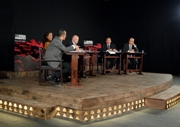 GAMAL ABDEL GAWAD SOLTAN
GAMAL ABDEL GAWAD SOLTAN
It is not about the actual violations and a lot of violations are taking place. It's about the role that the army is functionally performing in taking care in pushing the case for reform in this country. And I think functionally they do a lot of mistakes, but functionally considering how the configuration of political forces are - Islamism, liberals and the people - I think they serve a good cause for reform.
TIM SEBASTIAN
All right. General Seif-Elyazal.
SAMEH SEIF-ELYAZAL
What we're doing now is we're taking one mistake or one issue and we're talking about it and trying to make a snowball out of it. Let's see the entire picture and judge the entire picture. If you judge that, maybe 70-80 percent was, with the decisions they made, I think it's correct. The rest I have some hesitation.
Vote result
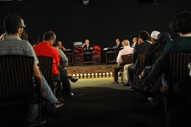 TIM SEBASTIAN
TIM SEBASTIAN
Okay, all right. Ladies and gentlemen, we've come to the point now where we're going to vote on the motion, "This House believes the Egyptian military is not interested in genuine reform". Would you please take your voting machines. Let me just explain to you how they work. If you want to vote for the motion - that is the side represented by those on my right - you're going to need in a moment to press the number 1 button. If you want to vote against the motion - that is the side represented by those on my left - you press button 2. And whichever button it is that you want to press, please do it now. You only have to press once. Thanks to the miracles of modern science, your vote will be communicated to the computers.
There's the vote! [Applause] 84.7 percent for the motion, 15.3 percent against. The motion has been resoundingly carried. All it remains for me to do is to thank our distinguished speakers. Thank you very much for being here tonight. Thank you to you, the audience. The Doha Debates will be back again next month. Till then, from all of us here in Cairo, have a safe journey home. Thanks for coming. Good night! [Applause]
Watch online




